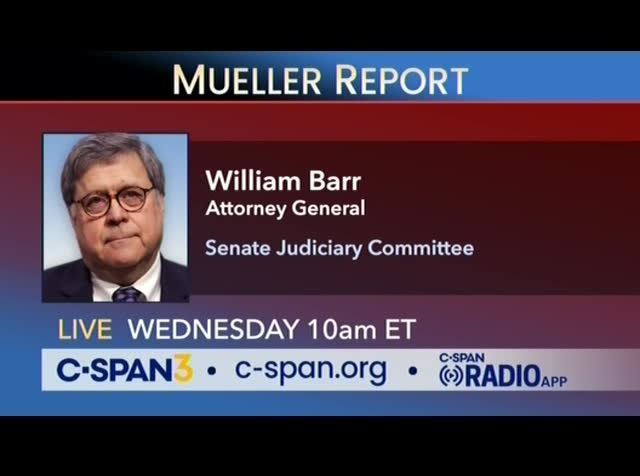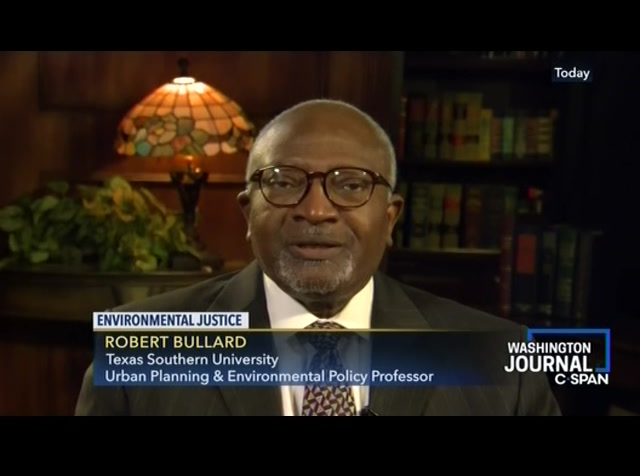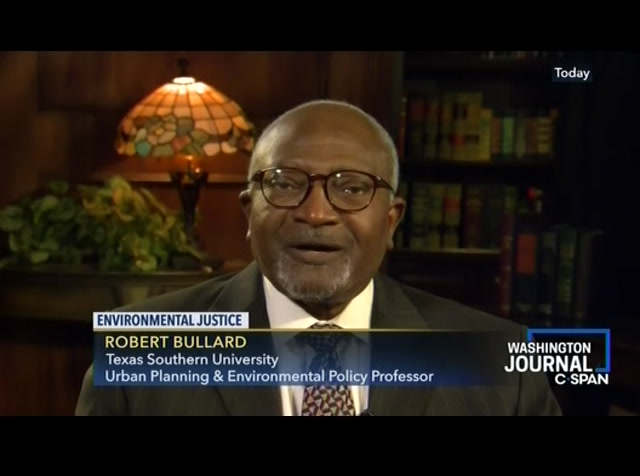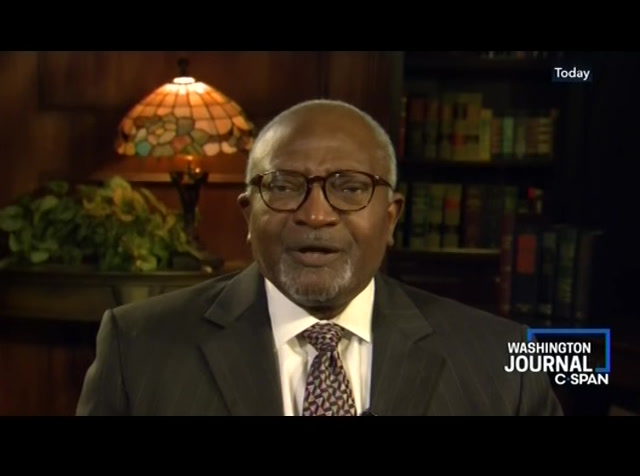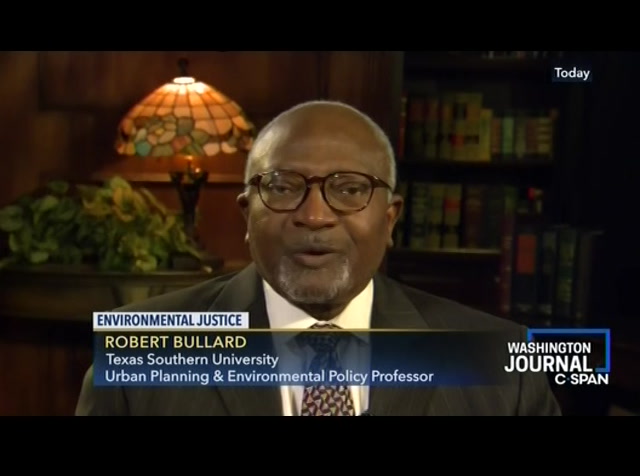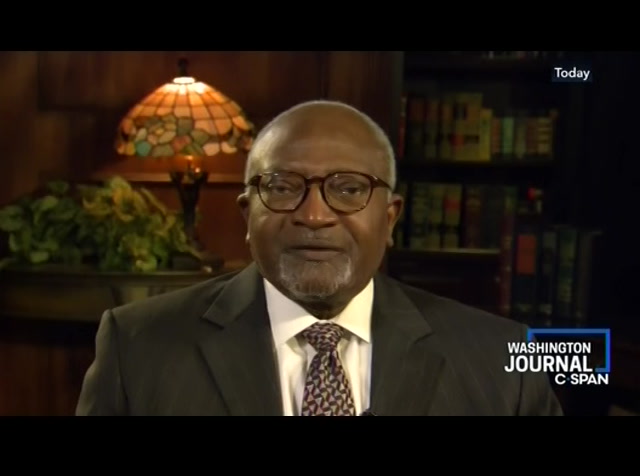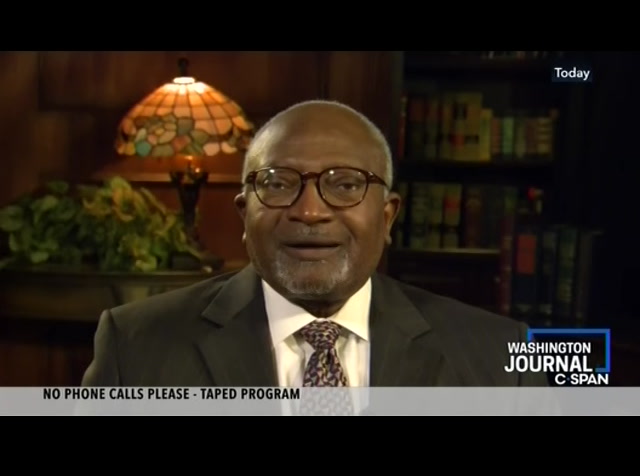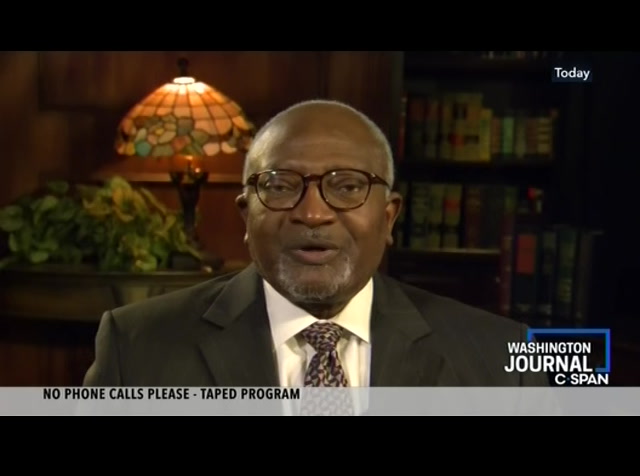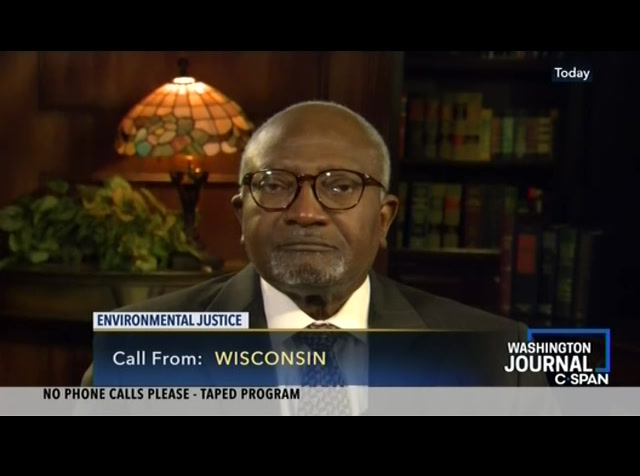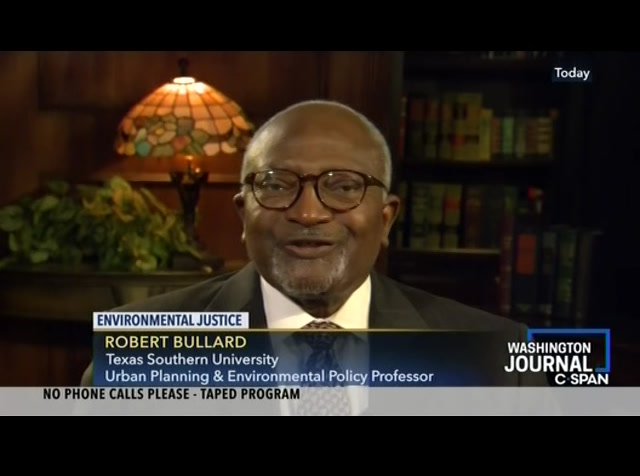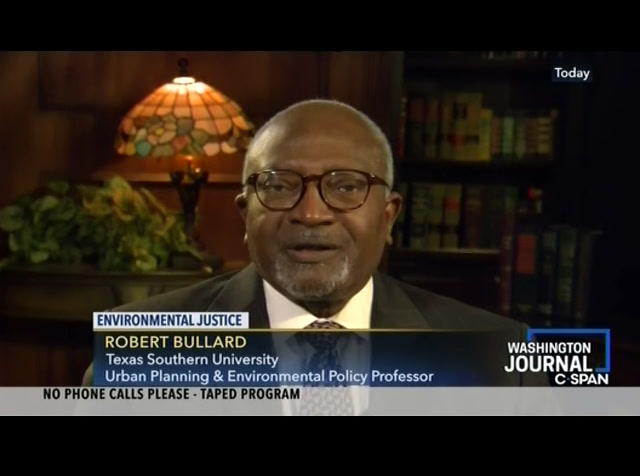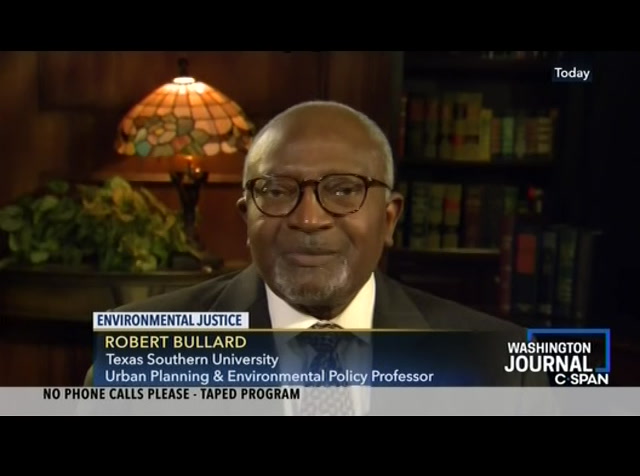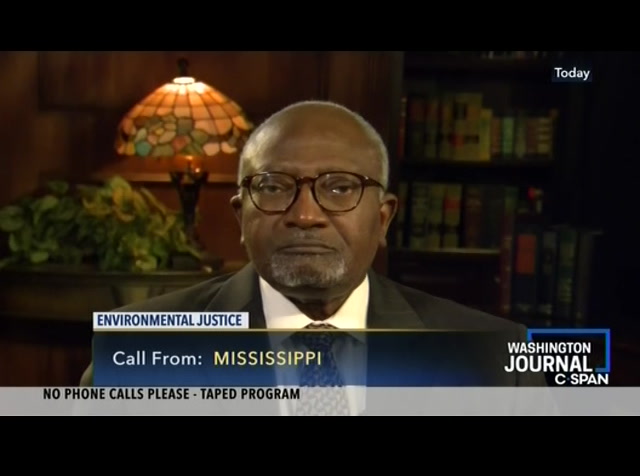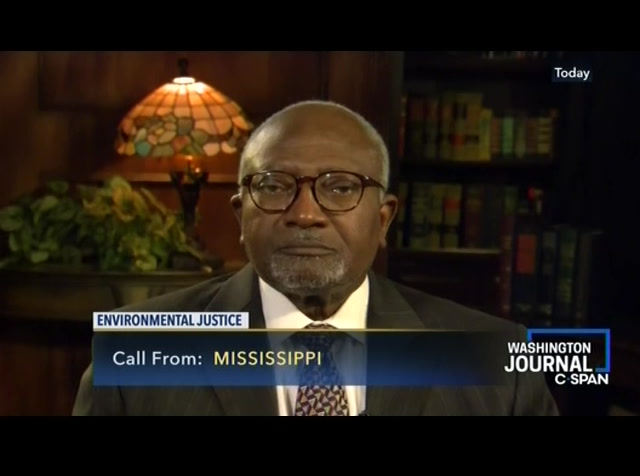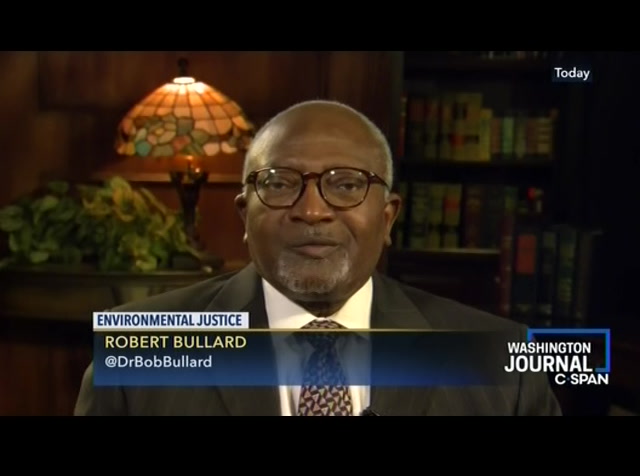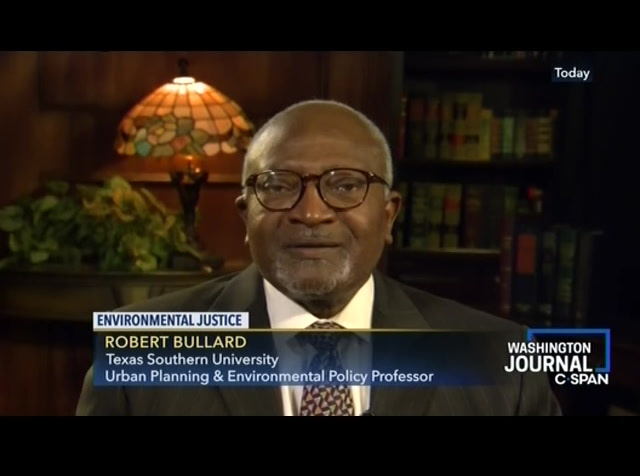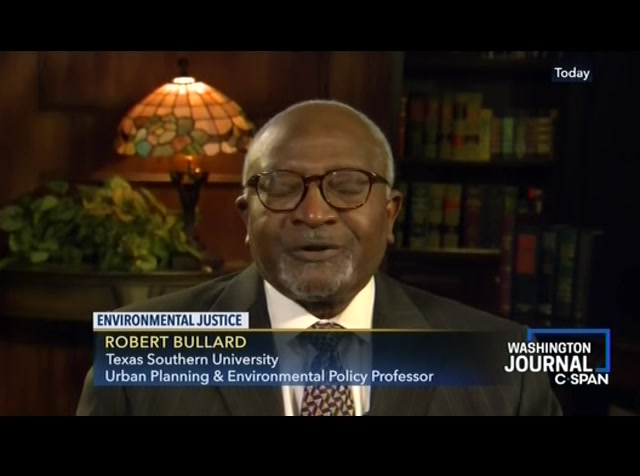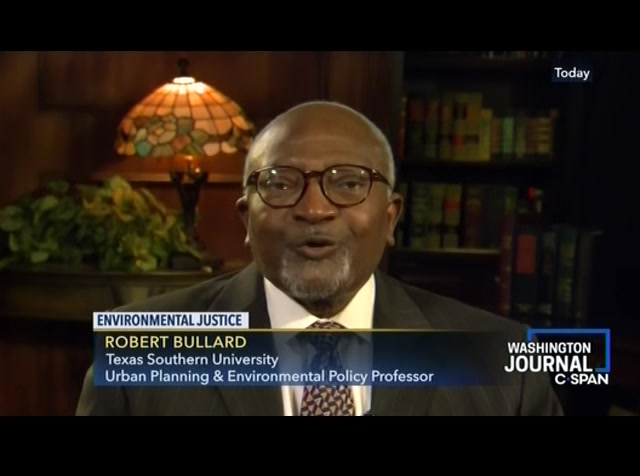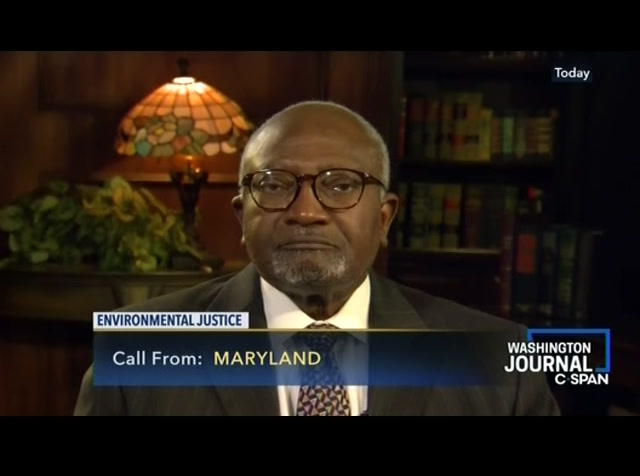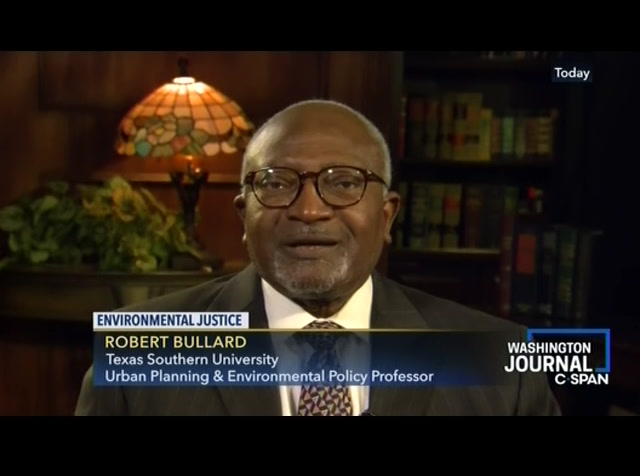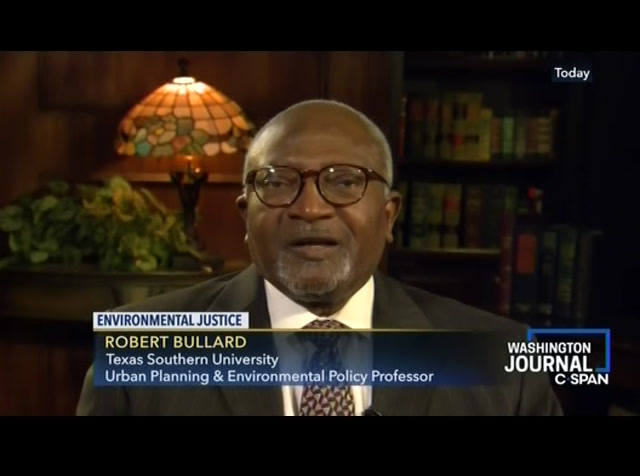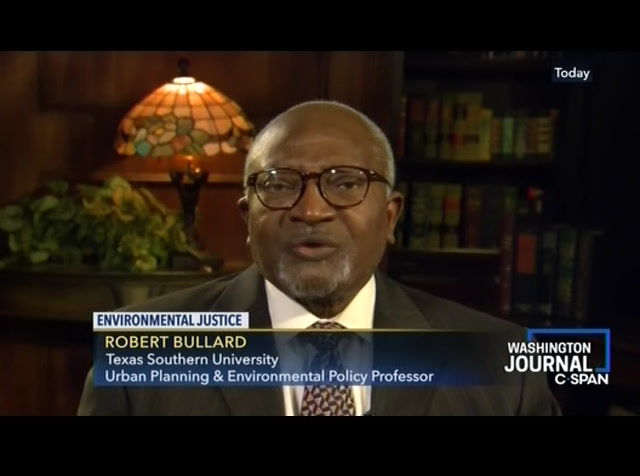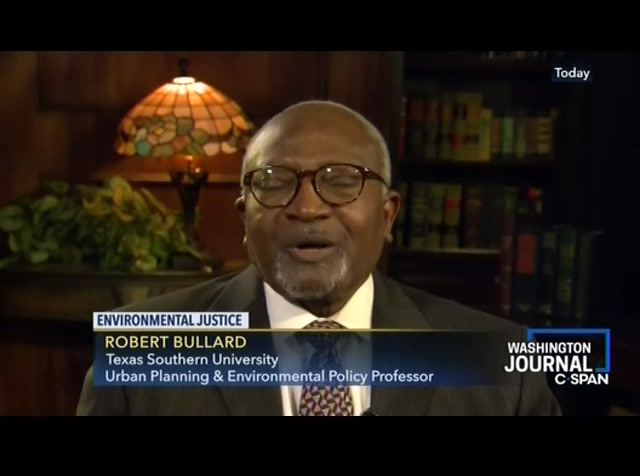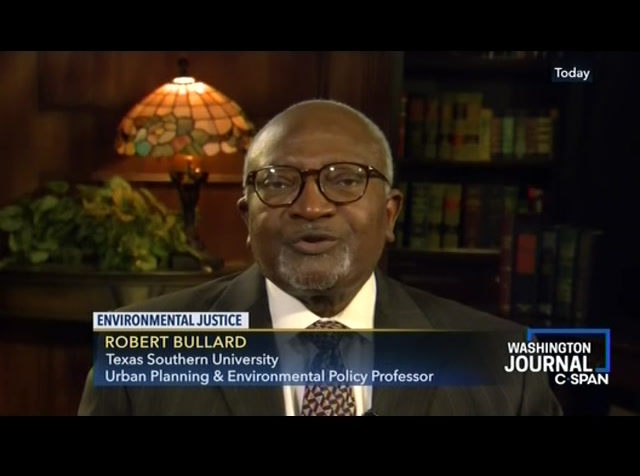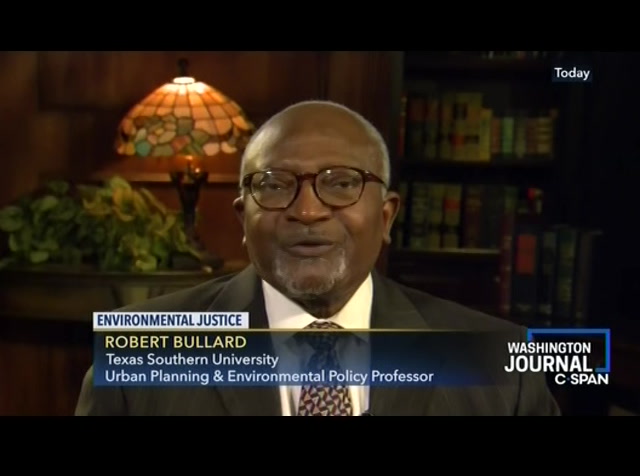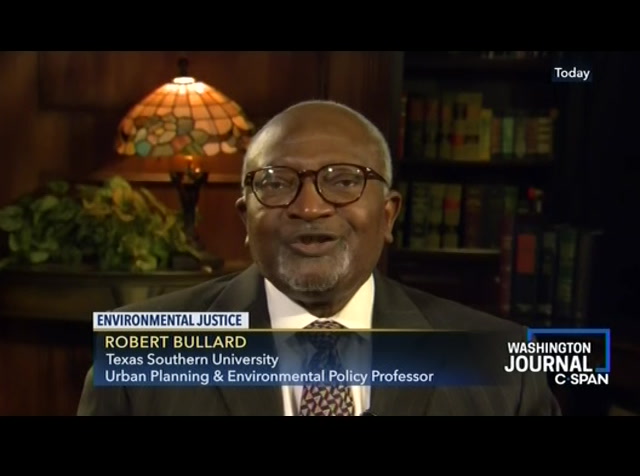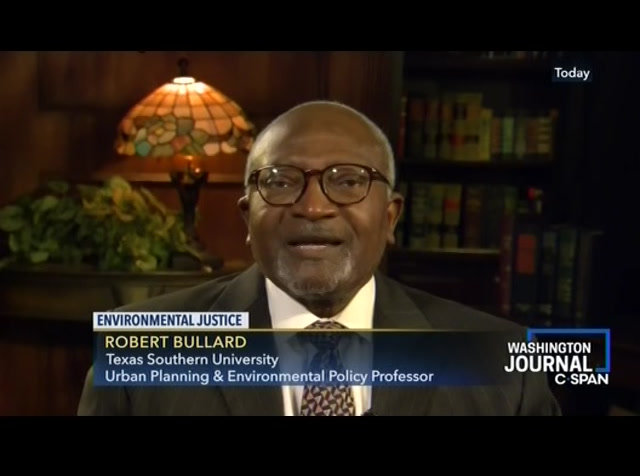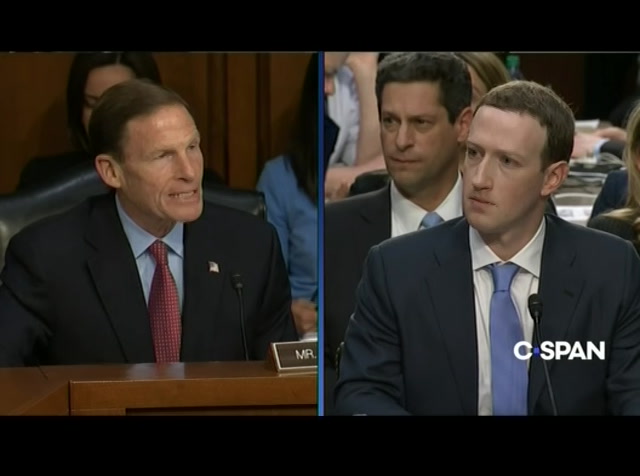tv Washington Journal Robert Bullard CSPAN April 24, 2019 7:33pm-8:01pm EDT
7:33 pm
heads to capitol hill twice next week to testify on the mueller report. his first appearance is wednesday before the senate judiciary committee at 10:00 a.m. eastern. on thursday he speaks to the house judiciary committee at a time to be determined. we will have live coverage on c-span3. you can also watch online on c-span.org or listen on the c-span radio app. that story at " coming bullard, who is referred to as the environmental justice movement. he will discuss future of that movement. host: mr. bullard. first, begin by defining environmental justice. caller: environmental -- guest: environmental justice embraces the idea that all communities have the right to equal protection under
7:34 pm
environmental law. it is the idea that no community deserves to be dumped on or polluted, that it is basically a civil rights, human rights issue. host: when did you get involved in this movement and why? well, in 1978 before there was a movement, i was involved in a lawsuit. i was an expert witness on a case that involved -- right here in houston, where there was a plan to place a municipal landfill in the middle of a predominantly black community. lawsuit on filed a the part of the residence, and i got drafted into that lawsuit and i had 10 students in my research class at texas southern. what we discovered, from the 30's to 1978, 100% of all the were --ed landfills
7:35 pm
when i say predominantly black, these are all black communities that were created by jim crow. city of eight of the incinerators were located in black neighborhoods. three out of four landfills are located in black neighborhoods. the 1930'sumped from up to 1978, most of it was dumped into black neighborhoods, even though blacks make up only 20% of the population. it was the first environmental racism case that used civil rights law, challenging that this should not be sent to a disproportionate community while everybody produces garbage. this was way back in 1978.
7:36 pm
host: did you win? guest: we lost a lawsuit, but we won a war. this is a case where we showed was not environment somehow valued by all as the same. all communities are not created equal, that some are more equal than others. class or other, incinerators, refineries, or chemical compounds, et cetera for this is before there was a movement this is 1978 the environmental justice movement really took off in 1982 in warren county, north carolina, with the location of a toxic waste dump. mobilized,nized and
7:37 pm
five hundred people arrested, saying no to being dumped on, note to pollution, no to environmental racism. host: is it different than the larger environment of movement? guest: of course it is different. the environmental movement, conservation movement has been around since the 1880's. for the most part, the environmental movement, the green movement was predominantly that reallye-class, did not address many of the issues that disproportionately impacted poor people and people areolor, and people who basically disenfranchised politically, economically. so the environmental justice movement was a response to the lack of issues being addressed by the larger movement. the environmental justice movement is a grassroots,
7:38 pm
bottom-up of mint that takes into account the fact that solutions and dumping and environmental degradation should not be targeted to just one community. having a clean and safe environment should not somehow be an aspirational thing. it should be something that works in all communities. the environment of justice movement deals with the intersectionality of environmental issues, civil rights issues, health issues. the core issue that brings them together is justice. .ost: republicans, 202-748-8001 democrats, 202-748-8000. .n independents, 202-748-8002 have things improved since that lawsuit in the 1970's? guest: we made a lot of progress in getting the awareness out,
7:39 pm
that this is really an issue. it is not something made up by some radical wildlife a sociologist -- wildlife sociologist. where people live impacts the quality of life. if you look at zip codes being the most potent predictor of health and well-being and quality of life, all zip codes are not created equal. we have been able to build a movement that is not just the united states, but globally. we have been able to establish research centers at the colleges and universities. courses are being taught, has been changed across the colleges and universities. we have gotten some of the states across the country, at least 48 states have passed environmental justice legislation, executive orders, or laws to deal with these issues.
7:40 pm
orders have executive signed by president clinton in 1994 to deal with this issue. the organist, the fact that more people are working on these issues, young people, students -- we have made progress. but the issues of communities of color and poor people are being disproportionately impacted, being dumped on, still exist. racism in the environment of has noton apparatus been eradicated. and as long as we have this type of injustice, we will still have a movement. nate, watching from milwaukee, on our line for democrats. caller: thank you very much for having me. , thinkingg to ask about the law and lawsuits are really of the two global warming, which is already causing damages to people. as we look forward, we will
7:41 pm
probably be coming -- be using more property damage to people. two i can think of are the ricocanes that hit puerto and houston, and how people lost their homes thanks to global warming. and in houston, they do not really warn you beforehand, so they know there are places that developers just let the customer deal with that. without giving them at least a warning that their house, where they are planning on living, is not going to be safe if a hurricane heads their way. so i think this is extremely disrespectful. property, when people areing claiming they want to protect people's private property. host: professor bullard?
7:42 pm
injustice is a major issue being addressed across the globe. here in the united states, i wrote a book on hurricane race playingng at and environment. if you look at communities that , flooded, apacted lot of conditions created vulnerability that were there before the flooding. climate change and global warming will exacerbate the disparities that exist. i live in houston, and i had to evacuate. if you look at the communities that were impacted, the greatest by the flooding from harvey, there is an environmental justice component. largest population minorities,
7:43 pm
african-americans, that were affected. rainsithout torrential like harvey, places flood. when we talk about the justice part of addressing climate change or addressing issues related to the disasters, studies after studies have found that instead of money and proposals for recovery following need, what happens is that money follows money. money follows power, and money follows whites. in many cases, communities of color are even worse off in terms of the value in equity when it comes to property values. what it communicates is that the money that goes to disaster he -- disaster recovery, there is a lesson in how we address climate. the question is, will the
7:44 pm
government respond to climate response to climate change be fair? in many case, awareness does not take place. it is oftentimes the dominant pattern and paradigm of power. host: mississippi, we will go there next and talk to her become on our line for democrats. caller: good morning. papere an international and they went on here and pull down the plan. there were schools -- pulls down the plant. there were schools next to to it. district, the international paper mill was able to pull our lawsuits out. we have a senior hospital. they had the records of what is going on with our people here. they know that we are dying in a
7:45 pm
massive number. they came in and justify doing what they did by putting out water treatments instead of doing anything for the people. but i think our real problem is, it is our black caucus. we really need reparations because, like this gentleman is saying, without money you cannot get the right representation. just like people have loaded it in the prisons and everything else. making sure that you are not economically powered like jewish people. jewish people have power because they have money. they have the players to help them. but when we have our black caucus, our black caucus is being led by the democratic that us off the site issues, like chasing after russian collusion and things like this, where we as black people are really suffering.
7:46 pm
we are allowing people to come in this country and have more rights than black people do. host: we will leave it there. professor? book a number a of years ago called "dumping in dixie." like moss communities point, black communities in the south that hosted polluting facilities, and in many cases these facilities were not brought to communities by black people. they were not voted in, they came in and often times sat down on top of these communities, and some of these communities were founded right after slavery, so the communities basically had fought and survived slavery, and jim crow, and after these industries came in, in the
7:47 pm
1950's, post-world war ii, some of them do not exist anymore. they have been pushed out. they have been basically populated. it is ironic -- they have been basically depopulated. it is ironic that many of them could not survive racism. goesical power oftentimes hand-in-hand with environmental justice. addressare trying to issues of economic justice, environmental justice, a lot of , basicallyawsuits the strategy of last resort, are getting people educated and informed about what is coming out of the smokestacks and what is happening to can the community in terms of health impact and getting people aware that there are other ways to mobilize and get the enforcement that is needed. again, the fact that the
7:48 pm
environmental justice movement has come about to really make people aware of all of those components and how things are connected. host: has the democratic party done enough on environmental injustice? guest: let me just say this. the injustice that has taken place over the last decade, or even centuries, has not been democrats, republicans. it is basically people in power. none of the parties have done enough to address racism and discrimination. so the fact that we have laws with allon the books different administrations that come in, the laws on the books, whether talking about civil rights laws, housing, employment, voting -- most of these laws are not enforced equally across the board.
7:49 pm
environmental protection is no different. when we talk about getting more and more democrats to step up to the plate, of course they need to step up to the plate. in thisican-americans country are democrats. but the fact that that is the case does not necessarily mean that industries will enforce their compliance. so we have to make sure that our elected officials really are accountable and are forced to make these industries accountable. and whether or not you have a republican or democratic administration, if pollution is lowering people's operative values and creating health problems, it should not matter. it is pollution with lead or mercury, gets in the air or the ground or the water, gets into the schools that are next to those facilities, it should not matter whether there is a republican mayor or president or
7:50 pm
a democratic governor, we should enforce the law because the impact on health is the same. host: kenny from laurel, maryland, independent. caller: i really appreciate what you're doing. thank you for your work and your team. i think it gets to the point where it comes down to education. engineer, i work with water resources. we have public meetings or community meetings, and we see where the people show up. if you are -- most of these injects -- it is a mixture wealthy neighborhoods and poor neighborhoods. but i think the differences, the wealth gap, not necessarily the race gap but the wealth gap, rich people, wealthy people show up to these public meetings,
7:51 pm
express their opinions, and their voices are heard. but when you go to some of these foreign immigrants -- not necessarily black or white -- you get a lower turnout and public participation. so i really think that education is the key here. necessarily a race issue but more of a wealth issue -- the rich versus the poor. host: let's take that point. let me just stop you right here. the data, the research, the studies, at least four case of studies are showing that race is still the most potent factor that determines who gets dumped on. are enforced in terms of our laws. you know, the study that i did
7:52 pm
in houston, the case that i talked about early on in 1979, all the landfills that were located in houston black communities, they were not all poor communities. the subject was a black middle class suburban subdivision. ts ownedhe residen their homes. every study done by the united church of christ in 1979 showed that race was still the most potent factor that determines where these facilities are located. when we updated in 2007, we found the same thing. 56% of the residents live within a one-mile radius of hazardous waste facilities in the united states, they were people of color. that number joins to -- people only make up about 38%, 39% of
7:53 pm
the u.s. population. in the study that was done by a sociologist at the university of colorado, african-americans who make $50,000 to $60,000 a year likely -- will more likely live in polluted areas than whites who makes $10,000. you find that those factors oftentimes determine what goes into your neighborhood and what does not go into your neighborhood. the negative impact of all of this pollution up whenh really shows we talk about something like asthma rates. four to fiveen are times more likely to be hospitalized. black children are 10 times more -- this is not just a sexy topic or a trendy topic or just
7:54 pm
talking about poverty. it is also talking about race and how race into plays with environmental protection. host: scott is a republican in lafayette, louisiana. you are on the air. caller: thank you, greta. i wanted to ask your guest about two or threeite examples of economic justice successes in the united states. host: professor? guest: economic justice means that when decisions are being enginesbuild economic for a particular area, whether it is some type of corporate business, et cetera, there needs that some kind of equity goes into who will benefit, and also we need to calculate what the costs are in terms of externality. oftentimes that is not done. as we move to greening our
7:55 pm
energy, when we talk about renewable energy in wind and solar, we need to talk about making sure that poor people and people of color, and people who have been left behind also benefit from that. getting more and more people of color owned businesses, going into renewable energy, talking about this sustainable agriculture, looking at hermann farms -- at urban farms, issues related to educational opportunities for having more of our colleges and universities, distort label colleges and universities become greener and more sustainable -- historically black colleges and universities become greener and more sustainable, and that young people are given more opportunities to have careers in different fields where we are underrepresented. it is not just jobs that we are talking about but also
7:56 pm
businesses, having greener businesses and using those types grow ourunities to economy, but also to spread the wealth. host: mack is next in augusta, georgia. independent. caller: yes, thank you, professor bullard. appreciate your time, appreciate the topic. i am concerned that we have a lot of hypocritical people in the country that think that they want to protect the environment at somebody else's expense, at their own environment, they want you to leave it alone. for instance, in los angeles and in san francisco, you have feces on the street, needles on the street, very dangerous situation to the health of the people who live there. yet the people in charge not do anything about it. that does not seem to be environmental justice to me. thank you, sir. guest: environmental justice
7:57 pm
goes to the issue of health, the physical environment, the natural environment. transportation. you know, looking at energy, looking all of those things that intersect. communities that oftentimes may jobs,ve access to oftentimes the same communities that do not have access to health care or transportation. so when we talk about cleaning up a city and greening up a city and getting a city, making it more livable and sustainable, it also means dealing with homeless , poverty, and dealing with low wealth communities. i think when we look at the full issue of intersectionality, where we live, work, play, worship, as well as the physical and natural environment, that is what environmental justice is. it does not leave a lot off the
7:58 pm
table. as long as we just see the environment as a physical environment or the wetlands or out there as opposed to the urban environment and how it connects with cities and suburbs and rural areas and people, is the and animals, that larger context of what environmentaland making sure ths left behind because you are poor . you shouldn't have to struggle to get to a park just because you are physically on the other side of the tracks. we have food deserts. neighborhoods without grocery stores. neighborhoods that don't have parks. these are the same neighborhoods where people have challenges getting to jobs. bringingwe talk about justice and equity into that framing, that is how our
7:59 pm
movement, our environmental justice movement has grown and has started to shape much larger movements for all. host: if our viewers want to learn more, you can go to tsu.edu >> baby was a three networks and one supporter called bbs. was three networks and one supporter called pbs. c-span opened the door to policy washington -- washington policymaking for all to see. in the age of power to the people, this was true people power. the landscape has clearly changed. there is a monolithic media. broadcasting has given way to narrowcasting. youtube star's ari thing.
8:00 pm
but c-span -- youtube stars are a thing. servicean is a public provided by your cable or satellite provider on television and online. c-span is your unfiltered view of government so you can make up your own mind. announcer: tonight on c-span, senator kamala harris holds a campaign event in hanover, new hampshire. then, north korean relations with north korea and the u.s. -- with russia and the u.s.. announcer: senator kamala harris officially launched her presidential campaign in january. this road to the white house event is 40 minutes. ♪ [cheers and applause]
59 Views
IN COLLECTIONS
CSPAN Television Archive
Television Archive  Television Archive News Search Service
Television Archive News Search Service 
Uploaded by TV Archive on

 Live Music Archive
Live Music Archive Librivox Free Audio
Librivox Free Audio Metropolitan Museum
Metropolitan Museum Cleveland Museum of Art
Cleveland Museum of Art Internet Arcade
Internet Arcade Console Living Room
Console Living Room Books to Borrow
Books to Borrow Open Library
Open Library TV News
TV News Understanding 9/11
Understanding 9/11